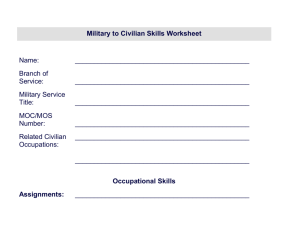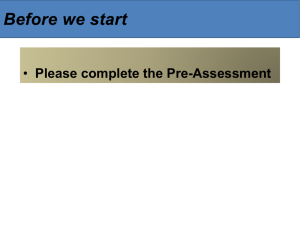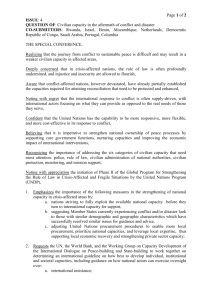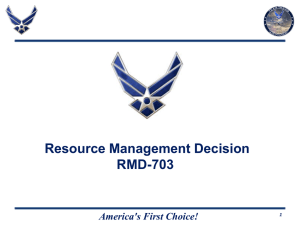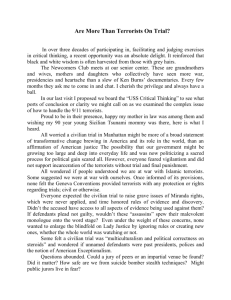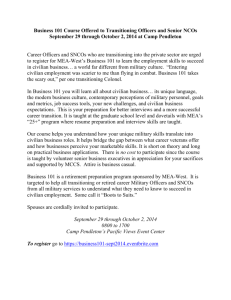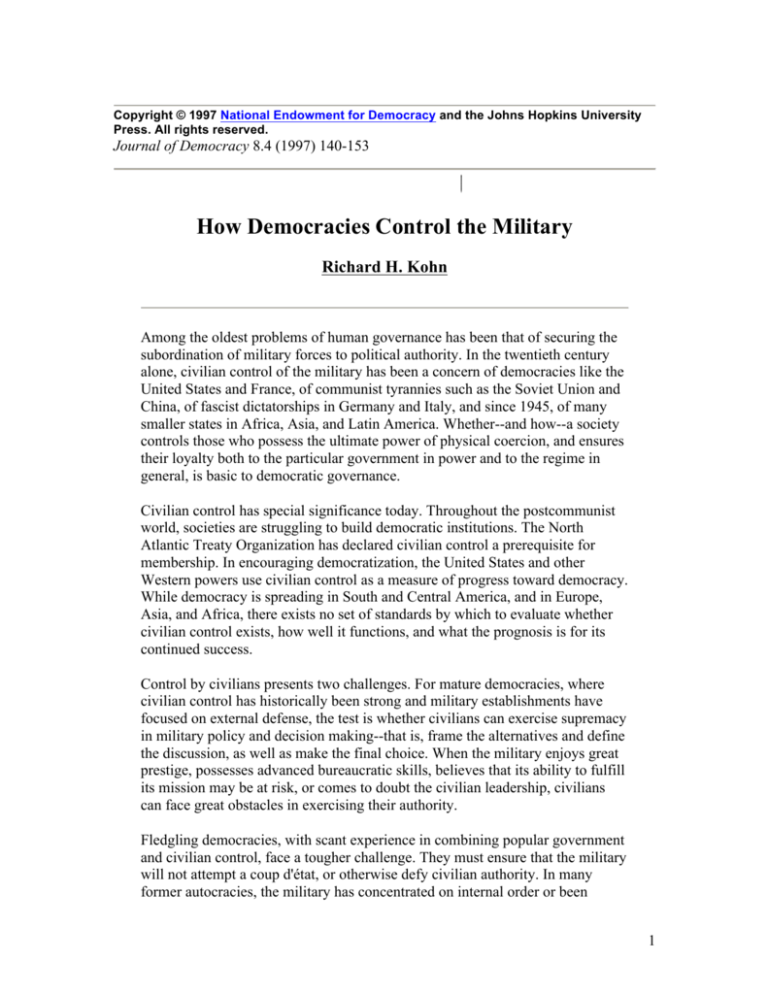
Copyright © 1997 National Endowment for Democracy and the Johns Hopkins University
Press. All rights reserved.
Journal of Democracy 8.4 (1997) 140-153
How Democracies Control the Military
Richard H. Kohn
Among the oldest problems of human governance has been that of securing the
subordination of military forces to political authority. In the twentieth century
alone, civilian control of the military has been a concern of democracies like the
United States and France, of communist tyrannies such as the Soviet Union and
China, of fascist dictatorships in Germany and Italy, and since 1945, of many
smaller states in Africa, Asia, and Latin America. Whether--and how--a society
controls those who possess the ultimate power of physical coercion, and ensures
their loyalty both to the particular government in power and to the regime in
general, is basic to democratic governance.
Civilian control has special significance today. Throughout the postcommunist
world, societies are struggling to build democratic institutions. The North
Atlantic Treaty Organization has declared civilian control a prerequisite for
membership. In encouraging democratization, the United States and other
Western powers use civilian control as a measure of progress toward democracy.
While democracy is spreading in South and Central America, and in Europe,
Asia, and Africa, there exists no set of standards by which to evaluate whether
civilian control exists, how well it functions, and what the prognosis is for its
continued success.
Control by civilians presents two challenges. For mature democracies, where
civilian control has historically been strong and military establishments have
focused on external defense, the test is whether civilians can exercise supremacy
in military policy and decision making--that is, frame the alternatives and define
the discussion, as well as make the final choice. When the military enjoys great
prestige, possesses advanced bureaucratic skills, believes that its ability to fulfill
its mission may be at risk, or comes to doubt the civilian leadership, civilians
can face great obstacles in exercising their authority.
Fledgling democracies, with scant experience in combining popular government
and civilian control, face a tougher challenge. They must ensure that the military
will not attempt a coup d'état, or otherwise defy civilian authority. In many
former autocracies, the military has concentrated on internal order or been
1
deeply involved in politics, sometimes preying on society rather than protecting
it. There the chief requirement is to establish a tradition of civilian control, to
make the military establishment politically neutral, and to prevent or preclude
any possibility of military intervention in political life. The task will still remain
to establish civilian control over national security policy and decision making.
But in the new democracies, civilian efforts to gain supremacy over military
affairs risk provoking military defiance, or, if public opinion does not support
the civilians, perhaps even military intervention.
What are the common characteristics or experiences that have, historically,
fostered civilian control under democracy? While this essay is based mostly on
Western and particularly Anglo-American experience, the analysis applies to
any society that practices, or is making the transition to practicing, government
based upon the sovereignty and will of the people.
For democracy, civilian control--that is, control of the military by civilian
officials elected by the people--is fundamental. Civilian control allows a nation
to base its values, institutions, and practices on the popular will rather than on
the choices of military leaders, whose outlook by definition focuses on the need
for internal order and external security. The military is, by necessity, among the
least democratic institutions in human experience; martial customs and
procedures clash by nature with individual freedom and civil liberty, the highest
values in democratic societies.
Because their basic purpose is to wage armed conflict, military institutions are
designed for violence and coercion, and over the centuries have developed the
organizational structure, operating procedures, and individual values needed to
succeed in war. Authority in the military emphasizes hierarchy so that
individuals and units act according to the intentions of commanders, and can
succeed under the very worst of physical circumstances and mental stresses.
While many of the military's professional values--courage, honesty, sacrifice,
integrity, loyalty, service--are among the most respected in human experience,
the norms and processes intrinsic to military institutions diverge so far from the
premises of democratic society that the relationship is inherently adversarial and
sometimes unstable. Military behaviors are functional imperatives. If society
were to be governed by the personal ideals or institutional perspectives of the
military, developed over centuries to support service to the state and sacrifice in
war, then each individual citizen (and the national purpose) would become
subservient to national security--to the exclusion, or at least the devaluation, of
other needs and concerns.
The point of civilian control is to make security subordinate to the larger
purposes of a nation, rather than the other way around. The purpose of the
military is to defend society, not to define it. While a country may have civilian
control of the military without democracy, it cannot have democracy without
2
civilian control.
Defining Civilian Control
In theory, civilian control is simple: All decisions of government, including
national security, are to be made or approved by officials outside the
professional armed forces, in democracy, by popularly elected officeholders or
their appointees. In principle, civilian control is absolute and all-encompassing:
No decision or responsibility falls to the military unless expressly or implicitly
delegated to it by civilian leaders. Even the decisions of command--the selection
of strategy, of what operations to mount and when, what tactics to employ, the
internal management of the military--derive from civilian authority. They are
delegated to uniformed personnel only for reasons of convenience, tradition,
effectiveness, or military experience and expertise. Civilians make all the rules,
and they can change them at any time. 1
The reality is quite different. For a variety of reasons, military establishments
have gained significant power and achieved considerable autonomy, even in
those democracies that have long practiced civilian control. In some countries,
the military has by custom kept control over much of military life; in others,
governments have never managed to develop the tools, the procedures, the
influence with elites, or the prestige with the public needed to establish
supremacy over their armed forces. For the most part, however, a degree of
military autonomy has grown out of the need to professionalize the management
of war. In the last two centuries, war has become too complex--the preparations
too elaborate, the weapons too sophisticated, command too arduous, operations
too intricate--to leave the waging of combat to amateurs or part-time
practitioners. As a result, the influence of the professional military has grown,
and it has sometimes used democratic processes to further its own professional
and institutional independence.
Forty years ago, the great theorist of civilian control Samuel P. Huntington
argued in The Soldier and the State that the way to optimize civilian supremacy
was to recognize such "autonomous military professionalism." In arguing for
what he called "objective civilian control," Huntington asserted that the state
should encourage "an independent military sphere" so that "multifarious civilian
groups" would not "maximize their power in military affairs" by involving the
military in political activity. Such interference, he believed, not only diminished
the effectiveness of military forces and thus a nation's security, but actually
invited the military to involve itself in governance beyond national security
affairs. An officer corps focused on its own profession--and granted sufficient
independence to organize itself and practice the art of war without interference
in those areas requiring technical expertise--would be politically neutral and less
likely to intervene in politics. 2 The paradox of Huntington's formulation is that
while "objective" civilian control might minimize military involvement in
3
politics, it also decreases civilian control over military affairs.
The critical issue is where, and how, to distinguish between military and civilian
responsibility. With war increasingly dangerous, civilians want more control to
ensure congruence with political purpose; with weapons and operations
becoming ever more technical and complex, military officers want more
independence to achieve success with the least cost in blood and treasure. Where
to divide authority and responsibility has become increasingly situational, and
uncertain.
The truth of the matter is that, fundamentally, civilian control is not a fact but a
process. It exists along a continuum, running from the extreme of countries that
are ruled by military establishments or experience frequent direct or indirect
military intervention in politics, to those that do not even possess standing
military forces. The best way to understand civilian control, to measure its
existence and evaluate its effectiveness, is to weigh the relative influence of
military officers and civilian officials in decisions of state concerning war,
internal security, external defense, and military policy (that is, the shape, size,
and operating procedures of the military establishment).
Sometimes, where civilian control is weak or nonexistent, military influence
laps over into other areas of public policy and social life. Even in mature
democracies that have long practiced civilian control, the balance between
military and civilian varies with time and place, with the personalities involved,
with the personal or political ambitions of senior military officers and leading
politicians, and with the circumstances that give the military prestige and weight
in public opinion. Even in those democracies with rich traditions of unbroken
civilian dominance, war and security can (and have) become so important in
national life and so central to the definition of the state that the military,
particularly during or after a crisis or war, can use its expertise or public
standing to limit civilian influence in military affairs. But even beyond such
circumstances, civilian control depends frequently on the individuals involved:
how each side views its role and function; the public respect or popularity
possessed by a particular politician or political institution or military officer or
armed force; the bureaucratic or political skill of the various officials.
If civilian control of the military is a process defined by the relative influence of
civilian and military officials, then the central issue confronting scholars and
policy makers today is how to judge the extent to which civilian control exists,
how well it functions, and whether it is sufficient for democratic governance.
Ultimately, civilian control rests upon a set of ideas, institutions, and behaviors
that has developed over time in democratic societies. Together, these practices
check the likelihood that the military will interfere in political life; they form a
system that provides civilian officials with both the authority and the machinery
to exercise supremacy in military affairs. Civilian control contains inherent
tensions and still suffers periodic strains and lapses, but the system can be
4
introduced and made to function in almost any country where democracy begins
to take root.
The Foundations for Civilian Control
The first requirement for civilian control in democracy is democratic governance
itself: the rule of law, civil liberty, a stable method for peaceful succession in
power, workable practices for electing officials, and a government and
governing process (perhaps spelled out in a written constitution) that are
legitimate in the eyes of both key elites and the general public. Civilian control
can reinforce democracy, but civilian control is only one aspect--necessary but
not sufficient--of democratic rule. Without a stable and legitimate governmental
system and process, the military may interfere in order to protect society from
chaos, internal challenge, or external attack--even when intervention may itself
perpetuate instability and destroy legitimacy in government. The tradition of
legitimacy in government acts on the one hand to deter military interference in
politics, and on the other to counteract intervention should it threaten or occur.
Furthermore, the state must, as a matter of standing national policy, clearly
specify the role of the military. Certainly uniformed leaders can and should be
consulted in this process as the mission of the military changes to suit new
conditions. But the military cannot define its own function or purpose.
Additionally, every effort must be made to limit the military to external defense
so that it functions as a representative of the whole society, acting in the best
interest of the entire nation. Only in the direst of emergencies should military
forces be used to secure internal order; they must see themselves, and be seen, as
the guardians and not the oppressors of the people. The courts, the police, the
militia, or border guards should keep order and execute the laws. Tasking the
military with everyday law enforcement, as opposed to maintaining order as a
last resort, pits the military against the people, with a loss of trust and
confidence, eventual alienation on both sides, and a diminishing of civilian
control.
A second foundation for civilian control lies in the operating mechanisms of
government--the methods by which civilian authority rules military forces. If
they are to function as an expression of the whole society's will, their
subordination must be to the entire governmental structure, not simply to the
incumbent president or prime minister. Divided control does contain dangers.
The military can become adept at boosting its own influence by playing civilian
authorities against one another. But separation of authority reduces the
possibility that the executive could use the army to overturn the constitution or
coerce the legislature. Accountability to the legislature implies accountability to
the people, forcing public discussion and scrutiny of defense policy, budgets,
and cases of military mistakes or malfeasance. Active parliamentary oversight
makes military affairs more transparent, and should actually strengthen national
defense by reinforcing military identification with the people and popular
5
identification with the military. The judiciary plays a supporting but
indispensable role, holding members of the military personally accountable to
law.
A third element that fosters civilian control is countervailing power. The
military can be blocked from even considering interference in two ways. The
first is through force brought to bear by other armed bodies in society (such as
the militia, the police, or an armed populace). The second is by the knowledge
that illegal acts will lead to personal disgrace, retirement, relief, fine, arrest, trial,
conviction, prison--whatever legal punishment fits the crime and can be made to
stick. The more likely it is that violations of civilian control will be resisted and
punished, the less likely they are to occur. Historically a most effective
counterweight has been a reliance on citizen-soldiers as opposed to full-time
professionals. Knowledge that revolt would lead to crisis and be opposed by an
armed populace, or that citizen forces might not heed illegal orders, has been an
effective deterrent. Standing forces should also be kept as small as security
permits: so that the populace will consent to provide the resources, the military
will be devoted solely to external defense, and civil-military friction will be
reduced.
Finally, a critical underpinning of civilian control must be the military itself. The
essential assumption behind civilian supremacy is the abstinence by the military
from intervention in political life. While coups have diminished worldwide over
the last decade, in many places the threat lingers. In still others, the military has
the power to make or break governments, or to impose or block policies wholly
outside the realm of national security. Civilian control is, by its very nature,
weak or nonexistent if the armed forces can use force or influence to turn a
government out of power, or to dictate the character of a government or policy.
Even the hint of such extortion, if unpunished, inhibits civilian officials from
exercising their authority, particularly in military affairs. Thus civilian control
requires a military establishment dedicated to political neutrality: one that shuns
under all circumstances any interference with the constitutional functioning or
legitimate process of government, that identifies itself as the embodiment of the
people and the nation (and not a particular party, agenda, or ideology), and that
counts unhesitating loyalty to lawful authorities and the system of government
as crucial aspects of its professionalism.
In mature democracies, where military intervention in politics is no longer an
ongoing concern, the same professional ethos is crucial if civilian control is to
function properly. The military must possess a sophisticated understanding of
civilian control and actively promote it, for in the process of policy and decision
making, senior officers must abstain from insinuating their own preferred policy
outcomes or outmaneuvering civilian authority even when they can get away
with it. Because of their expertise and role as the nation's guardians, military
leaders in democracies can possess great public credibility, and can use it to
limit or undermine civilian control, particularly during and after successful wars.
6
The difficulty is to define their proper role and to confine their activity within
proper (even if often indistinct) bounds. The Israeli scholar of civil-military
relations Yehuda Ben Meir contends that the military should advise civilians and
represent the needs of the military inside the government, but should not
advocate military interests or perspectives publicly in such a way as to
undermine or circumscribe civilian authority. And the military must never
become an advocate, public or private, for a particular policy or decisions that
extends beyond its professional sphere. 3
Helpful to this ethos is an officer corps that is, in every respect possible,
representative of the larger society. While some countries have enjoyed civilian
control with officers drawn only from particular races, religions, classes, or
ethnic backgrounds, it seems wiser to build an officer corps that equates itself
with the national population and identifies its first loyalty as being owed to the
country rather than to the profession of arms. To draw officers from a single
segment is to risk creating a group that sees itself as separate from and superior
to society. If they see their own values as being at variance with those of the
population and their loyalties to their group of origin and to the military as
primary, they may delude themselves into thinking that their purpose is to
preserve or reform society's values and norms, rather than safeguard the nation's
physical security.
Nor should serving military personnel participate in any fashion in politics, not
as members of parties, in elected office, or even in appointive office as members
of a political administration at the local or national level. If officers belong to a
political party, run for office, represent a particular group or constituency,
publicly express their views (or even say how they voted), attack or defend the
executive leadership--in short, behave like politicians--they cannot be trusted by
voters or by other politicians to be neutral servants of the state and guardians of
society. Even personal identification with a political program or party can
compromise an officer in the performance of his or her duty.
In theory, nothing prevents armies from interfering in politics or even attempting
to overturn their government. But where civilian control has succeeded over a
long period, military professionals have internalized civilian control to an
extraordinary degree. In those countries, the people and civilian leaders expect,
because of law or tradition, military subordination to civil authority. The organs
of public opinion, in the press and among elites, accept the principle, and in
times of stress in civil-military relations declare it as an axiom of government.
Some countervailing power to the military force may exist, but military
personnel understand that any step toward insubordination would immediately
provoke a crisis that by consensus they would lose, with the possibility of legal
sanctions against them personally.
Yet ultimately, it is the military's own professionalism and restraint that on a
daily basis maintains civilian control. Whether or not they would face dismissal
7
or prison, they choose to submit, to define their duty as advice to civilian bosses
rather than advocacy, and to carry out all lawful orders effectively and without
complaint. But because civilians frequently lack knowledge and understanding
of military affairs, and the apportioning of military and civilian responsibility
depends so often on circumstances, the relationship even in the most stable
governments has been messy, uncertain, and periodically tense. And thus,
historically, the degree of civilian control, that is, the relative weight of the
civilian and the military, has depended on the people and the issues involved.
Civilian Control Day-to-Day
Because civilian control is a process, it depends heavily on the organization and
functioning of a government. The military cannot perform its duty, nor can
civilians exercise their authority, unless the machinery of government allows
military and civilian perspectives to mix in the formulation of policy, enabling
the two sides to understand each other and work together. Military
establishments tend naturally to try to maximize their autonomy in order to gain
the resources that they believe necessary to organize, arm, and recruit most
effectively for their tasks. Armed forces in democracies instinctively strive to
accomplish their tasks with the fewest casualties and the smallest risk of failure.
So strong are those impulses that commanders and staffs sometimes try to
control the definition of the mission or to stipulate the rules of engagement, to
the point of circumventing or evading the direction of their civilian superiors.
The challenge in democratic government is to exercise civilian authority while
satisfying the legitimate needs of the military in its pursuit of national security.
The first and most important feature of organization is a clear chain of command
under all conceivable circumstances, with the head of the government atop that
chain. Even before democracy developed, command defined civilian control--all
the way back into biblical times when kings and tribal leaders directed battles
personally. If the executive power in government cannot always control where,
when, and how military forces are used, then civilian control cannot be said to
exist. And because of the nature of military command, this power must reside in
a single individual; there must be no opportunity for confusion, which could
excuse disobedience. In governments that have both a president and a prime
minister, final authority and operational control must reside in one office or the
other. Furthermore, any disobedience must be treated as mutiny or revolt, with
the attendant harsh penalties.
The second critical need is to ensure that the decision to begin or end warfare
lies in civilian hands, and that in the transition from peace to war, even when
indistinct, the military can respond unhesitatingly to proper orders. Such
decisions often determine the fate of whole societies. Democracy cannot
function if people other than the elected leadership decide issues of such
magnitude; war causes the military to expand, the power and importance of
government to grow, and its intrusions into people's lives to increase--including
8
more taxes, limits on freedoms, and perhaps compulsory military service.
The third critical area is military policy, meaning broadly all decisions affecting
the size, shape, organization, character, weaponry, and internal operating
procedures of the military establishment. Other than strategy and operations in
wartime, peacetime military policy excites the most friction between civilian
and military officials, and offers the greatest opportunities for the military to
exercise its influence. If in peacetime military officers instead of elected
officials make such choices--particularly regarding who can and cannot serve
and how much money goes into defense--then the military controls the shape
and character of a society.
These three broad but basic areas where civilians must rule cover nearly every
conceivable aspect of national security. Theoretically every detail lies in the
hands of civilians. Yet the reality, once again, is quite different. While civilians
may possess the legal authority and may have the opportunity to exercise their
influence even to the point of irresponsibility, there are definite practical limits
to the exercise of these powers. In all three categories, civilians would be quite
unwise and very much open to criticism if they made decisions without
consulting the professionals who study war and defense full-time, possess actual
experience, and carry considerable prestige with elites and the public. Military
advice and cooperation are crucial to the quality and effectiveness of policy, and
uniformed opposition, whether public or mounted behind the scenes, can, given
the right circumstances, destroy the policy and devastate civilians' standing, and
even their careers. The public expects that "the experts" will be involved and
that their judgment, depending on the situation and personalities, will receive
proper weight. Political opponents of the party in power will use military
opinions, especially those that vary with a decision or policy, in the give-andtake of public debate. Thus in the process of civilian control, both civilian
officialdom and the military are bound within limits and enmeshed in a
reciprocal relationship; how each behaves depends upon a complex mix of
factors, some unique to the situation and some the products of the broader
institutions, practices, and traditions of civilian control. Critical to both process
and outcome are the ways in which a government makes military policy and
administers the military establishment.
Checks and Balances
In the waging of war and the management of military forces, civilian control
operates most effectively when exercised by the executive branch of government
or the ministry. But broader decisions regarding the size and character of the
forces must come from the legislature, the body of government representing the
people as a whole, which must possess its own machinery for investigation and
review. The two branches must cooperate if the military is to function. Such
divided but shared rule--the system of checks and balances--benefits civilians
and the military alike. Civilian control grows stronger because no civilian can
9
alone use the military to abuse power, and the military possesses both the
efficiency of unitary command and the legitimacy of sanction by the people's
representatives.
Historically, the executive, in addition to commanding the forces and conducting
war, proposes military policy, including the budget and initiatives relating to the
very existence and functioning of the armed forces. The executive commissions
officers, recruits and trains troops, promotes and assigns individuals, formulates
(or at least oversees) strategy and operations, buys weapons, issues orders, and
makes decisions about virtually every aspect of military life. Every chief
executive relies on a ministry or department of defense; civilian control requires
a civilian minister or secretary, supported by a civilian bureaucracy of sufficient
experience and technical expertise to gain the confidence of politicians and
voters on the one hand, and of the military on the other. This can be a tense
relationship in democracies, one marked by continual bargaining, negotiation,
and conflict as well as cooperation. Neither side wholly trusts the other, nor can
it. Some problems--for example, strategy, the rules of engagement for forces at
risk, the operational authority of commanders, the types of weapons, the roles
and missions of the services, and the size of the defense budget--are continually
at issue or regularly renegotiated. But it is imperative that the president and
prime minister be advised and served by civilians; the bonds of trust and loyalty,
the self-identification, and the shared experiences and perspectives of the
professional military are so strong that politicians cannot afford to rely
exclusively upon military officers, whether serving or retired. At a minimum, a
"second opinion" from outside (as in medicine), is necessary.
Especially in nations new to democracy, where the military carries the burden of
loyalty to previously autocratic governments, the public should insist that a
civilian serve as defense minister. This official, in turn, will require an expert
staff from outside of the military to gather information and provide independent
advice. Judgments about the size and character of the risks a nation faces,
whether to institute or practice conscription, what weapons to purchase, and a
variety of other choices invariably possess social, economic, and political
implications that go beyond narrow security considerations. Nearly every
society faces conflict between domestic needs and defense, choices which in the
end are political in the purest sense of that word. In a democracy, by definition,
elected rather than uniformed leaders must make those choices.
The role of the legislature is to approve the existence of the military (usually by
appropriating money), make policy on the size and character of the armed
forces, oversee their activities (including formal investigation of any issue or
incident), and approve actions taken by the executive. Crucial to this process are
hearings to air publicly all matters that can be discussed without breaching
military secrecy. It is critically important to civilian control that the parliament
exercise these powers independently of the executive (though the two branches
may sometimes share authority). In testimony under oath before the legislative
10
branch, the military is held publicly accountable, and officers can be required to
express their personal as well as professional views if asked. Thus the legislature
can get the military expertise it needs in order to exercise intelligent oversight.
Because civilian control rests ultimately on the behavior of individuals, armed
forces personnel policy is critical. Typically, the executive and legislature share
authority here. Civilians must decide who serves and whether or not there is to
be compulsory military service, the ultimate intrusion of government into the
private lives of individuals in democratic societies. The decision must be the
result of some consensus in society, and not be imposed by the military. Equally
important are the policies relating to the commissioning, education, promotion,
assignment, and retirement of officers. It is the officer corps that historically has
defined military establishments. Officers provide not only the leadership in war
and in peace, but continuity over time to the military profession. Like every
profession, the military strives to limit outside jurisdiction over its domain, to
define its own requirements for membership, its own standards of behavior, the
scope of its expertise, the principles for advancement and assignments, the
character of its relationship with clients and society generally, and virtually
every other aspect of its professional world, including the limits on membership
and power within the group. Because of the unique responsibilities of battle, the
military must possess a large measure of autonomy. Civilians recognize the
legitimacy of much of this self-definition, to the point even of permitting a
separate system of justice, with different categories of crimes and punishments
for members of the armed forces. Civilians recognize that both civilian control
and military effectiveness require that the officer corps be insulated from
partisan politics, particularly from the promotion and assignment of officers on
the basis of partisan affiliation. But civilian authority must restrict autonomy to
what is necessary and functional.
To the extent that the military is a self-defining and self-perpetuating elite, it is
less subordinate to the rest of society. The executive and legislature must control
officer promotions; there must be mandatory retirements so that no one person
can come to control the military forces indefinitely. In countries where civilian
control is weak, support for military subordination to civilian authority should
be an essential criterion for promotion and assignment. But the partisan leanings
of an officer, if they exist, should never enter the equation, or the officer corps
will be politicized and corrupted.
The exercise of civilian control by parliament occurs through legislation, much
of which must rely on open hearings and a process of oversight that holds the
military and the civilian defense bureaucracy accountable. Lawmakers must
have access to, yet safeguard, the information necessary for policy making and
for investigating malfeasance and failure. Information must be demanded and
provided, which in turn puts parliament under the obligation to ask only for that
classified information that is necessary for oversight, legislation, and policy, and
never to release classified information. The legislative branch must be able to
11
compel testimony from officials, punish false statements, and require military
officers to express their professional opinions independent of policy on all
matters before, during, and after decisions are made. The process is inherently
contentious. For the military, it is especially awkward, for it frequently squeezes
them between two bosses. It can also be politically explosive. Parliament must
hold the ministry accountable or legislative power will cease to have effect.
Parliament's most potent weapon is financial; by withholding money or directing
its uses (hence the importance of limited-term budgets), parliament wields a
mighty club over the rest of government. But budgets are also a clumsy weapon.
By approving officer promotions and assignments, especially at the senior
levels, parliaments can negotiate compliance to policy and demand obedience
from individual military leaders.
Finally must come arrangements to ensure that, as a matter of course, individual
members of the military are held accountable to the law for their actions. While
most countries recognize the necessity for a separate legal system for the
military to ensure obedience in battle and enforce discipline, the system must
function under the jurisdiction, even if rarely exercised, of the civilian judiciary.
Military personnel must be held accountable to society for their individual
behavior, although not necessarily in exactly the same ways as civilian officials.
Military service imposes a harsher, more demanding set of requirements and
responsibilities. Yet the soldier's essential citizenship, with all of its obligations,
cannot be abolished or suspended, because in a democracy no one can be above
the law or beyond the reach of its sanctions.
A Difficult Transition
The widespread practice of democracy has emerged only in the last two
centuries. In formerly communist countries, and in others where military
dictatorship or intervention has occurred, the transition to civilian control is
likely to be difficult. To devise wise and workable procedures and policies will
require not only patience, but courage on the part of civilians, acquiescence on
the part of the military, and public support that will encourage both sides to
reach a stable relationship characterized by cooperation and mutual respect.
If civilian control is a process, and its measure is the relative influence of the
military over policy, then civilians and military personnel have to work together
day after day, week after week, year after year. Competent, effective, and
courageous civilian officials are indispensable to civilian control: men and
women who understand the military ethos, treat those who wear the uniform
with courtesy, contest them when necessary, and protect their professionalism
when others in the political arena attempt to gain partisan advantage by using or
abusing the military leadership. Senior officers fear being stuck with the blame
for policies or operations that fail not because of military mistakes, but because
of decisions by politicians. Some degree of confidence must be built up on both
sides; that, too, is highly situational, and rests in the hands of individual officials
12
and officers when they begin their working relationships. Military leaders need
direct access to the highest authority in the land; they need to be respected and
their counsel must be sought. Civilian leaders, whatever their background, must
come to know enough about military affairs to gain sympathy for the military's
professional needs, obligations, requirements, and perspectives. But they must
be tough enough to oppose military judgments when necessary and make their
authority felt in spite of the political risk. They will need the backing of the
voters. Civilian control must be accepted as axiomatic by the military, the
political leadership, and the populace. Military subordination to civilian
authority must be supported actively and vocally by the organs of opinion: the
media, the universities, political parties, commercial and professional
associations, and others. Without a vigilant press and a widespread public
understanding of the nature and importance of civilian control, it can appear to
be functioning properly but in actuality be quite weak.
As the next millennium approaches, newly emerging democracies, with longestablished armed forces accustomed to a large degree of autonomy, face the
challenge of reaching the point where they can say with confidence that they
have civilian control over their military. Military establishments unaccustomed
to having their judgment or authority questioned, especially by the cacophony of
groups and individuals (many of whom conspicuously do not subscribe to the
values and behaviors traditional to military groups) typical of democratic
governance, will experience an equally uncomfortable challenge. How that
transition is managed will be crucial in determining the fate of democracy
around the world.
Richard H. Kohn is professor of history and chairman of the Curriculum in
Peace, War, and Defense at the University of North Carolina at Chapel Hill. An
expanded version of this essay appears as "The Forgotten Fundamentals of
Civilian Control of the Military in Democratic Government," Working Paper 11
in the Project on Post-Cold War Civil-Military Relations, John M. Olin Institute
for Strategic Studies, Harvard University, and will be published in a volume of
essays on civilian control in small democracies sponsored by the Arias Center
for Peace and Reconciliation, San José, Costa Rica.
Notes
1. It could be argued that in constitutional systems, the "rules" are fixed in the
written charter. Constitutions can be amended, however, and in democratic
societies civilian courts interpret the laws and apply the constitution to specific
cases and general situations. Constitutional practice changes over time.
2. Samuel P. Huntington, The Soldier and the State: The Theory and Politics of
Civil-Military Relations (Cambridge: Belknap Press of Harvard University
Press, 1957).
13
3. Yehuda Ben Meir, Civil-Military Relations in Israel (New York: Columbia
University Press, 1995), 25.
.
14

